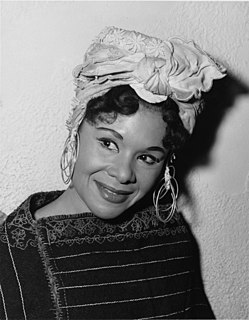A Quote by Ben Fountain
Haiti is unique - the first successful slave revolt in history, the first black republic etc., and then when you get into the culture, the voodoo, and that wonderful synchretization of Christian and African belief and symbology, it's like nothing the world has ever seen.
Related Quotes
Haiti was founderd by a righteous revolution in 1804 and became the first black republic. It was the first country to break the chains of slavery, the first to force Emperor Napoleon to retreat, and the only to aid Simón Bolívar in his struggle to liberate the indigenous people and slaves of Latin America from their colonial oppressors.
I am an abolitionist. What does this mean? Abolitionist resistance and resilience draws from a legacy of black-led anti-colonial struggle in the United States and throughout the Americas, including places like Haiti, the first black republic founded on the principles of anti-colonialism and black liberation.
The whole history between Haiti and the Dominican Republic is complicated. We share the island of Hispaniola, and Haiti occupied the Dominican Republic for twenty-two years after 1804 for fear that the French and Spanish would come back and reinstitute slavery. So we have this unique situation of being two independent nations on the same island, but with each community having its own grievance.
The shooter's choice of Emanuel AME was most likely deliberate, given the church's storied history. It was the first African Methodist Episcopal church in the South, founded in 1818 by a group of men including Morris Brown, a prominent pastor, and Denmark Vesey, who would go on to lead a large, yet failed, slave revolt in Charleston.
The 'civil rights' revolutionary groups are a case in point. Their goal is not equality but power. The background of Negro culture is African and magic, and the purposes of magic are control and power. . . Voodoo or magic was the religion and life of American Negroes. Voodoo songs underlie jazz, and old voodoo, with its power goal, has been merely replaced with revolutionary voodoo, a modernized power drive.
One of the things that made the Black Muslim movement grow was its emphasis upon things African. This was the secret to the growth of the Black Muslim movement. African blood, African origin, African culture, African ties. And you'd be surprised - we discovered that deep within the subconscious of the black man in this country, he is still more African than he is American.
The biggest surprise for me, without a doubt, was that the first black people who came to the United States weren't the 20 who arrived in Jamestown in 1619. All of us had been taught that. The first African came to Florida in 1513. And the huge shock is we know his name, Juan Garrido, and that he wasn't a slave. He was free!
Like the amazing story of Anthony Johnson. This man was a slave, then became free, accumulated 250 acres, and even had his own slave, a black man who took him to court in Virginia in 1654.That man argued that he should be freed like an indentured servant. But Johnson, who we believe was a pure African from Angola, said, "No way, you're my slave." And the court agreed.
The biggest surprise for me, without a doubt, was that the first black people who came to the United States weren't the 20 who arrived in Jamestown in 1619. All of us had been taught that. Well, guess what? The first African came to Florida in 1513. And the huge shock is we know his name, Juan Garrido, and that he wasn't a slave. He was free! This brother was a conquistador who came with Ponce de Leon. He was looking for the Fountain of Youth just like the white people were.



































